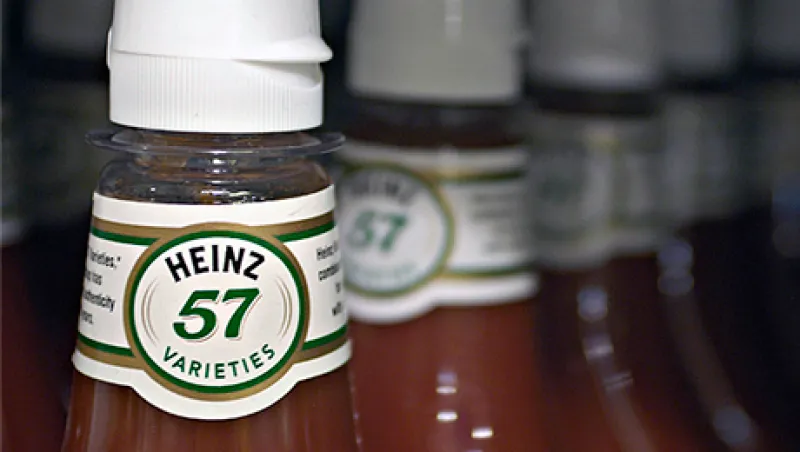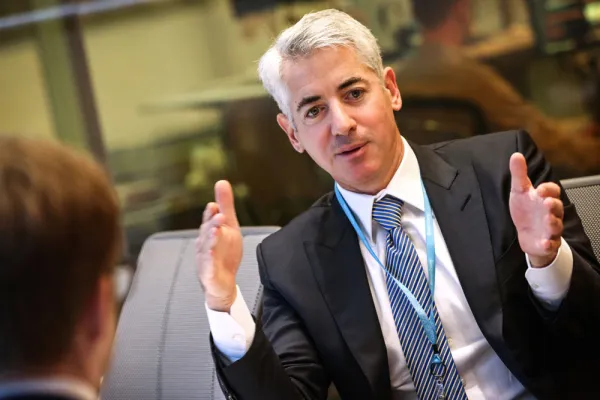< Deals of the Year 2015: Six Transactions that Made a Big Impact
If you like ketchup, you’ll love Jell-O and American cheese. On that assumption, Warren Buffett and Brazilian billionaire Jorge Paulo Lemann shelled out $5 billion each to combine their privately owned condiments maker, H.J. Heinz Holding Corp., with processed-foods giant Kraft Foods Group.
Buffett’s Berkshire Hathaway and 3G Capital, which started life as Lemann’s family office, took Heinz private together for $27.4 billion in 2013. Now they own 51 percent of publicly listed Kraft Heinz Co. after the $62.6 billion transaction, which closed on July 2. Kraft shareholders got 49 percent of the merged entity plus a one-time dividend of $16.50 a share, which the purchasers paid with $10 billion from their own ample pockets.
Kraft, based outside Chicago and best known for venerable convenience foods like Miracle Whip and Kool-Aid, is hardly a growth company in the era of kale and whole grains. But that is not the point for 3G, which has consolidated much of the world’s beer industry into Anheuser-Busch InBev — soon to include even more with an agreed takeover of top rival SABMiller — and acquired fast-food empire Burger King since storming out of South America in 2004. Like those companies and Pittsburgh-headquartered Heinz, Kraft is a household name whose operations have grown flabby, sources close to the deal say. 3G commands a migratory management team expert in cleaning house — 11 of 12 Heinz top managers were fired after that buyout — and squeezing new profit out of old ketchup or beer bottles. Heinz and Kraft brands also complement each other, as evidenced by the lack of antitrust concerns that bedevil the AB InBev–SABMiller deal.
Lemann made his first fortune by founding investment bank Banco Garantia in 1971, then multiplied it starting with two Brazilian breweries in the ’90s, when inflation peaked there at more than 2,000 percent. “3G’s experience running companies in a hyperinflationary environment in Brazil has contributed to a disciplined focus on an optimized cost structure,” says Alexander Hecker, New York–based co-head of consumer and retail investment banking at Lazard, which advised the 3G–Berkshire Hathaway team.
The combination of two old-fashioned companies was driven by an old-fashioned relationship between two no-longer-young investors. Buffett, 85, and Lemann, 76, have been friends since serving on the board of Gillette Co. together in the late 1990s. They bought Heinz on a 50-50 basis, with 3G, which has offices in New York and Rio de Janeiro, taking over operations. Buffett also took $8 billion in preferred stock that paid him an annual 9 percent dividend from Heinz. One attraction of the merger was the potential for using Kraft’s investment-grade credit rating to redeem these shares with cash borrowed more cheaply, which the parties intend to do in 2016. The combined company earned a BBB–, the lowest investment-grade rating, from Standard & Poor’s.
Because Buffett and Lemann didn’t borrow any new money to acquire Kraft, the deal could be transacted by old-school investment bankers acting as sole advisers, without the now typical laundry list of lending banks. History held the day here too. Lazard had worked for 3G on three previous transactions, including the Heinz purchase and the 2008 acquisition of U.S. brewing champion Anheuser-Busch Cos., which put the Brazilians on the global map.
Kraft was advised by Centerview Partners, the New York boutique launched in 2006 by Blair Effron, a consumer products rainmaker from UBS, and Robert Pruzan, ex-president of Wasserstein Perella & Co. Centerview previously worked for Kraft on its $19 billion takeover of U.K. chocolate maker Cadbury in 2010, and advised Heinz during the 3G–Berkshire Hathaway buyout there. Centerview stands to earn up to $97 million from Kraft Heinz, Freeman & Co. reports, while Lazard reaps as much as $66 million.
Investors gave a lukewarm greeting to Kraft Heinz’s shares, which started trading in July at $72.96. They have more or less broken even since then, a similar performance to No. 1 U.S. food producer PepsiCo and the broader S&P 500 index. If 3G can deliver on its promise to cut $1.5 billion in costs by 2017, that may change.
2015 Deals of the Year






